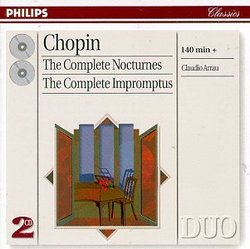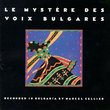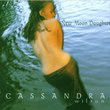| All Artists: Frederic Chopin, Claudio Arrau Title: Chopin: The Complete Nocturnes And Impromptus Members Wishing: 0 Total Copies: 0 Label: Philips Release Date: 8/12/1997 Genre: Classical Styles: Forms & Genres, Fantasies, Short Forms Number of Discs: 2 SwapaCD Credits: 2 UPC: 028945633626 |
Search - Frederic Chopin, Claudio Arrau :: Chopin: The Complete Nocturnes And Impromptus
 | Frederic Chopin, Claudio Arrau Chopin: The Complete Nocturnes And Impromptus Genre: Classical
Claudio Arrau considered the Nocturnes among Chopin's deepest, most searching works, rather than mere descriptive mood paintings, and he plays them that way. The same can be said vis-à-vis Arrau's Impromptus, with bro... more » |
Larger Image |
CD DetailsSynopsis
Amazon.com Claudio Arrau considered the Nocturnes among Chopin's deepest, most searching works, rather than mere descriptive mood paintings, and he plays them that way. The same can be said vis-à-vis Arrau's Impromptus, with brooding textures and cosmic breadth that leave the drawing room behind. --Jed Distler Similarly Requested CDs
|
CD ReviewsArrau is a masterful interpreter of Chopin Christopher Smith | Atlanta, Georgia | 02/28/2000 (5 out of 5 stars) "This is an inspired release by the Philips label; hopefully, it will generate new interest in Arrau's Chopin and give him the kind of credit he deserves. Arrau is so underrated as to almost pass unnoticed when the truly great exponents of Chopin are spoken of, yet I believe he belongs in the company of Horowitz, Rubinstein, Agerich, Pollini and Zimermann. Best known for his awesome Beethoven cycle, Arrau has an almost transcendent grasp of Chopin's many moods--he makes every Chopin piece he plays tell a compelling, unforgettable narrative. His chosen tempi really wring the emotion out of every note, but his treatment of a piece like the opus 15 #1 shows he has the kind of muscularity in his playing necessary to avoid being a mere Chopin sentimentalist. Arrau recorded most of his Chopin in the '70's, and his Ballades and Preludes are staggeringly good (I have yet to hear a better version than his of the fourth ballade). I am waiting for Philips to re-release these treasures on CD, and hopefully they'll do it as they did here with the Nocturnes and Impromptus--a remastered, 2CD for the price of one bargain. I started with the Nocturnes like many people do--by buying Rubinstein's set. They're fantastic, but Arrau just takes these pieces farther than I ever imagined they could go, and you can't ask for more than that. ps. Check out Arrau under the "Great Pianists of the 20th Century" series that's available here on Amazon if you want to further sample his enormous repertoire." A desert island disc Roger Townsend | Houston, TX USA | 01/09/2000 (5 out of 5 stars) "This is a marvelously conceived and executed version of the nocturnes. The word that comes most to mind is "poetic." Arrau is a master of incredible sensitivity to phrasing and dynamics. The remastered recording, while not so pristine as an all digital one, is still a major improvement over the original version. If you love Chopin, if you love the piano, or if you simply love human excellence and genuis in any endeavor, you will adore this recording." You must, among others, have this set. A. Rocheleau | Orlando, FL | 11/23/2006 (5 out of 5 stars) "Arrau's playing is unique, a throwback to the age of the romantic virtuoso of a century long gone. This set is rightfully famous, and is, with the 60's collection by Rubinstien and the 90's set by Pires, the three I have always most loved and recommended, though each is very different in its approach. Of the three, Rubinstein's is the most faithful to the "letter" of Chopin's score, but even then, Rubinstein's indomitable personality shines through. Pires takes some liberties with speed and dynamics-- so she rests nominally in the middle.
Then there is Claudio Arrau, and I agree with another reviewer that the pianist indeed treats each note as if matters. Does he dwell too much, slide into notes, take different dynamic turns, play with a rubato just this side of Paderewski or Busoni, and bathe the music in pedal at times?--yes, all of that. But let's face it, there is no "right" Chopin, and no recorded collection that is the be-all--because if so, it would sell Chopin's genius far short of its due. I and others choose to listen to all the above sets on their own terms and love all of them-- likewise the Cortot, and available selections of Horowitz, Godowsky, Friedman, Hofmann, etc. (Not to mention more recent, sublime interpretations in the concert hall by Tzimon Barto.) In any event, this 70's Arrau set holds its own,in its own way, with any and all of the above. For years, this was the set I listened to on LP, both at home and transferred to cassette to play in the car. Rubinstein's later became a favorite for me, finally Pires's. For purposes of sound, either of the latter two are preferable, but sound is definitely a secondary issue. Regarding that, I must say that the CD remastering of the Arrau has heightened not only the breathing issues, but also the too-close miking of the keyboard, so that, especially in one channel of the stereo mix, the sound the piano mechanism itself is often heard. That's close miking, too close really, but so what. I can live with it and with Arrau's exchange of breath for the individual quality of his music. In summary, this set should be in every collection, but so should the others, and perhaps three or four more that could be mentioned-- Cortot, perhaps Ashkenazy and Zimmerman too. Why so many? These pieces are part of the bedrock of romantic pianism, and far deeper in intellectual and spiritual intent than they are often credited with. On that, I agree with Arrau, that Chopin starts here, and should, after a wide foray, also finish here. " |

 Track Listings (13) - Disc #1
Track Listings (13) - Disc #1








